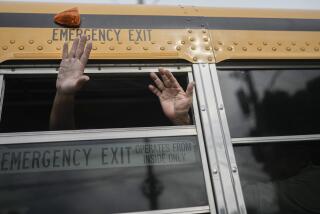Supporting the Contras in Peace
- Share via
Sometimes news travels slowly in Central America. Although the countries are small, the terrain is rugged--one reason Central America is an ideal setting for guerrilla warfare. Last week the region’s best-armed guerrillas, Nicaragua’s Contras, got some news they didn’t like hearing. Diplomats told them that their war is, for all intents and purposes, over.
The meeting marked the first face-to-face encounter between the Contras and the diplomats from the United Nations and the Organization of American States who have been asked to monitor the peace agreement signed by the five Central American presidents last August. At a Contra camp in Honduras, near the Nicaraguan border, members of the joint U.N./OAS commission used surprisingly blunt language in urging rebel troops and their commanders to accept the regional peace accord that calls for their army to be disarmed and disbanded.
“You know the situation: The Contras are not going to be reactivated,” U.N. diplomat Francesc Vendrell told the assembly. “Don’t stay here to be abandoned by a country that once helped you.” Vendrell obviously meant the United States. Under former President Reagan, the U.S. government sustained the Contras for seven years in the vain hope they would help topple the Sandinista regime in Managua. For many reasons--not least among them the obvious influence exerted over the Contras by the United States--the Nicaraguan rebels were never able to generate the popular support needed to sustain their rebellion. But they remain well-fed and well-equipped, thanks to their U.S. sponsors. Now they must be demobilized before they turn to banditry inside Honduras or terrorism in Nicaragua.
Neither the U.N. nor the OAS has the power or political influence to disarm the rebels and relocate them, so clearly the United States will have to play a major role in the process. The U.S. government also has a moral obligation to help the Contras. So the Bush Administration should reprogram the humanitarian aid scheduled to go to the Contras in November. Rather than providing material to keep them in their Honduran encampments, the money should be used to begin relocating those fighters willing to surrender their arms and return to civilian life. Those who ask to come to the United States, or other foreign countries, should be provided with the necessary refugee assistance.
But some Contra fighters, many of whom are peasants from the hinterlands of Nicaragua, may opt to return to Nicaragua. The Sandinistas say they can return home without danger. But it would be prudent to guarantee this with some incentives. One way to do that is to offer the Sandinistas rural development aid for the areas from which Contra fighters came. The Sandinista government needs financial assistance desperately, so while it might not like accepting U.S. aid with strings attached, they are unlikely to say no. And if they do,such aid can be funneled trough the U.N., OAS or other international agencies such as theWorld Bank. Whatever the channel, the United States must now be prepared to support the Contras as generously in peace as it did during wartime.
More to Read
Sign up for Essential California
The most important California stories and recommendations in your inbox every morning.
You may occasionally receive promotional content from the Los Angeles Times.













